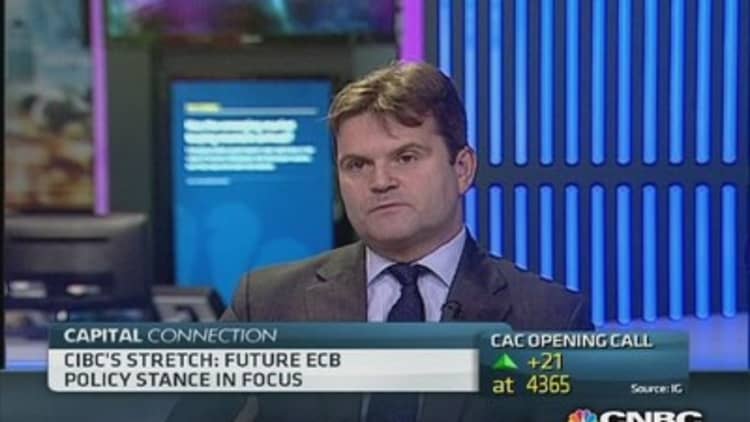There are nascent signs that the European Central Bank (ECB) may be considering buying bonds and other assets in an effort to stump up the euro zone's economy, in what would be something of a drastic change in policy.
The ECB has already sought to stop sliding inflation by lowering its main interest rate to a record low of 0.25 percent. Efforts to boost liquidity have seen the central bank offer ultra-cheap, long-term loans to banks, known as "long-term refinancing operations" (LTROs).
But earlier this week, ECB Governing Council member Jens Weidmann – governor of Germany's Bundesbank - told newswire MNI that an asset-purchase, or quantitative-easing (QE), program had not been ruled out. The comments were particularly striking given firstly, his reputation as one of the ECB's hawks, and secondly, the timing – with the next ECB monetary policy meeting due next week.
(Read more: Euro to strengthen even on ECB easing?)
Weidmann said the central bank should consider different monetary policy tools, and could look at buying up euro zone government bonds or top-rated private sector assets.
"Of course any private or public assets that we might buy would have to meet certain quality standards," he told MNI.
"But the overall question is one of effectiveness, costs and side-effects. We are currently discussing the effectiveness of these measures. The intended effects would then have to be weighed against the costs and side-effects."
Strange timing?
Unlike central banks in the U.K., U.S. and elsewhere, the ECB has not launched a QE program – mainly because there are no common euro zone bonds and the process of picking which country to buy is fraught with political dangers.
Jonathan Loynes, chief European economist at Capital Economics, said he was surprised by the timings of Weidmann's comments.
"It's not something that's been talked about a lot recently, what with the economy showing some signs of recovery," he told CNBC. "It's surprising he's talking about it now rather than a few months ago."
Loynes said the comments could indicate that the ECB had been doing some work on potential effects of an asset-purchase program, and the results had brought Weidmann round to the idea.
(Read more: ECB's Weidmann says QE not out of the question)
"It's not a comprehensive U-turn, but he's definitely softened his position on this a little bit," Loynes added.

One reason behind the comments could be lingering deflationary concerns in the euro zone, first ignited when October's data showed inflation had fallen to a 47-month low of 0.7 percent. In response, the ECB cut interest rates at its November meeting, and inflation data for February was revised down from 0.8 percent to this rate-cut level.
Indeed, these concerns about low prices – which could hinder the region's growth prospects – have spurred a number of ECB council members to speak out about new policy measures over recent days.
Finland Central Bank Governor Erkki Liikanen stressed that the introduction of negative deposit rates – under which euro zone banks would be charged for depositing cash at the ECB – were "not a controversial issue," in an interview with the Wall Street Journal.
He said that asset purchases did not pose a legal problem for the ECB, adding: "The central bank is always able to buy from the secondary markets."
Meanwhile, both Jozef Makuch, governor of the Slovakian National Bank, and Bank of Italy Governor Ignazio Visco warned of deflationary risks and said the ECB would take decisive action if necessary.
'Talk is cheap'
The comments sent the euro sliding around 0.5 percent against the dollar to 1.377 on Tuesday, before recovering to 1.382.
"The concerted talk by policymakers likely indicates an effort of verbal intervention to weaken the euro, reflecting fears that the euro could stoke deflationary pressures," Anatoli Annenkov, senior European economist at Societe Generale, said in a note.
"While talk is cheap, the ECB will ultimately need to back its words with credible measures, with the standard toolbox running on empty."
(Read more: ECB ups 2014 growth forecast, inflation to pick up slowly)
Deutsche Bank strategist Jim Reid said agreed, adding: "At least yesterday saw ground for hope for those looking for a better deflation firebreaker from the ECB."
All eyes will now be on the central bank's policy decision and President Mario Draghi's press conference on Thursday, April 3, when he is sure to be quizzed about the possibility of more drastic stimulus options.
Too controversial?
Until now, few economists have argued that the ECB was likely to resort to QE, with IHS Global Insight's Chief European Economist Howard Archer arguing, for instance, that it would prove "too controversial a policy" within the ECB's Governing Council to get adopted.
But BNP Paribas economists, led by Ken Wattret, have argued that "ECB QE is coming" for some time now. In a report published earlier this year, they said they expected the ECB to announce an asset-purchase program from this summer onwards to "meet its primary objective of maintaining price stability."
The economists forecast the ECB will announce an initial program in the range of 300-500 billion euros ($415-690 billion) – although they stressed that predicting the size of the program is "more of an art than a science."
Loynes, however, disagreed that an ECB bond-buying program was inevitable, but argued that it would likely have the biggest impact.
"We've been pushing the idea that they should - and may well - do it (QE)," he said. "We have penciled in an interest rate cut but would actually prefer QE because it's the only powerful tool left in the ECB's locker."
Follow us on Twitter: @CNBCWorld


